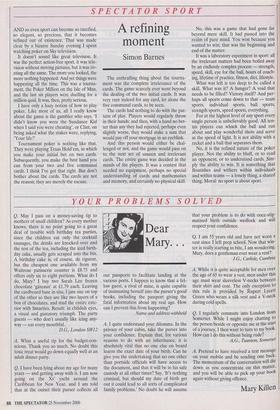SPECTATOR SPORT
A refining moment
Simon Barnes
AND so even sport can become so rarefied, so elegant, so precious, that it becomes refined out of existence. That was made clear by a bizarre Sunday evening I spent watching poker on Sky television.
It doesn't sound like great television. It was the perfect action-free sport, it was tele- vision without moving pictures, but it was riv- eting all the same. The more you looked, the more nothing happened. And yet things were happening all the time. This was a tourna- ment, the Poker Million on the Isle of Man, and the last six players were duelling for a million quid. It was, then, pretty serious.
I have only a hazy notion of how to play poker. Like most of us, all I really know about the game is the gambler who says, 'I didn't know you were the Sundance Kid when I said you were cheating', or Clint, on being asked what the stakes were, replying, `Your life?'
Tournament poker is nothing like that. They were playing Texas Hold'em, in which you make your initial bet on two cards. Subsequently, you make the best hand you can from your two and five communal cards. I think I've got that right. But don't bother about the cards. The cards are not the reason; they are merely the excuse. The enthralling thing about the tourna- ment was the complete irrelevance of the cards. The game scarcely ever went beyond the dealing of the two initial cards. It was very rare indeed for any card, let alone the five communal cards, to be seen.
The cards had nothing to do with the pat- tern of play. Players would regularly throw in their hands; and then, with a hand no bet- ter than any they had rejected, perhaps even slightly worse, they would stake a sum that would pay off your mortgage in an eyeblink.
And this person would either be chal- lenged or not, and the game would pass on to the next set of unseen and irrelevant cards. The entire game was decided in the minds of the players. It was a contest that needed no equipment, perhaps no special understanding of cards and mathematics and memory, and certainly no physical skill. No, this was a game that had gone far beyond mere skill. It had passed into the realm of pure mind. You won because you wanted to win; that was the beginning and end of the matter.
It was a laboratory experiment in sport: all the irrelevant matters had been boiled away by an endlessly complex process — strength, speed, skill, eye for the ball, hours of coach- ing, lifetime of practice, fitness, diet, lifestyle.
What was left is too deep to be called a skill. What was it? A hunger? A void that needs to be filled? Victory itself? And per- haps all sports come down to that — team sports, individual sports, ball sports, strength sports, speed sports, everything.
For at the highest level of any sport every single person is unbelievably good. All ten- nis players can whack the ball and run about and play wonderful shots and serve at the speed of light. It is not ability with a racket and a ball that separates them.
No, it is the refined nature of the poker player. Not the ability to bluff, or to read an opponent, or to understand cards. Sim- ply the ability to win. It is something that flourishes and withers within individuals and within teams — a lonely thing, a shared thing. Moral: no sport is about sport.





























































































 Previous page
Previous page